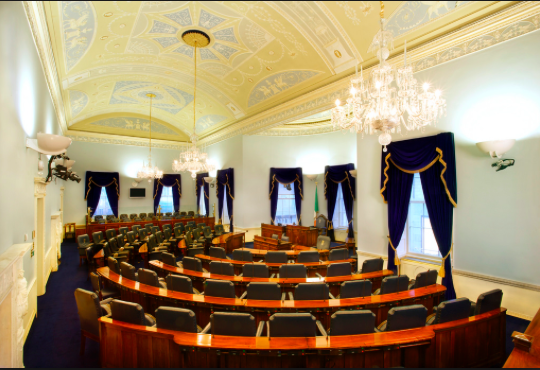Comment: Seanad Reform

Seanad Reform
Seanad Éireann needs to be restructured and reformed to bring it into line with international best practice for Second Houses of Parliament.
Reforms that I support include:
Retention of the vocational concept with legislative change to ensure access to nomination for as wide a range of candidates as is necessary to reflect the complexity and diversity of modern Irish society.
All 43 of the Panel seats for the vocational panels to be elected by popular vote.
Principle of one person one vote so that citizens who are eligible to vote in the university constituency must opt to vote either in that constituency or on one of the five panels available to all citizens.
Introduction of a system of online registration of voters and downloading of ballot papers
The primary function of the Seanad, the scrutiny, amendment and initiation of legislation, be augmented so that Seanad Éireann can make a distinctive contribution to the work of the Oireachtas.
Procedures implemented to ensure that all Senators are qualified to ensure that the legislation that they scruitinise, amend or initiate is equality and human rights compliant.
Report of the working group on Seanad Reform 2015
The Role of the Seanad Éireann
The main business of Seanad Éireann (Senate of Ireland) is the revision of legislation sent to it by Dáil Éireann. The Seanad is the upper house of the Oireachtas (the Irish legislature), which also comprises the President of Ireland and Dáil Éireann (the lower house). It is commonly called the Seanad or Senate and its members senators (Seanadóirí in Irish, singular: Seanadóir).
Seanad Éireann can initiate and revise legislation but under the Constitution its legislative role is restricted in that it cannot initiate Money Bills (i.e. financial legislation), and can only make recommendations but not amendments to such Bills.
The fact that a Dáil Bill must be examined also by Seanad Éireann is a safeguard against legislation being enacted too quickly. In addition to its legislative role, Seanad Éireann also debates important issues. As the Government is constitutionally responsible to Dáil Éireann, Seanad Éireann can debate these issues with greater freedom because the fate of the Government will not be at stake.
Seanad Éireann cannot delay indefinitely legislation which has already been passed by Dáil Éireann and cannot initiate Bills to amend the Constitution.
The Electorate and Voting System
Every citizen of Ireland over 21 years of age who is not disqualified by the Constitution or by law is eligible to be elected to the Seanad.
The Seanad is composed of 60 members, 11 members are nominated by the Taoiseach, 43 are elected from panels of candidates representing specified vocational interests and 3 members are elected by university graduates in the National University of Ireland and 3 members in the University of Dublin (Trinity College). Every citizen of Ireland who is at least 18 years old and who has received a degree, other than an honorary degree, from the university concerned is entitled to be registered as an elector.
A general election to the Seanad must take place not later than 90 days after the dissolution of the Dáil. Within 7 days of the dissolution of the Dáil the Minister for the Environment, Community and Local Government is required to appoint the relevant dates for the conduct of a general election of the Seanad. A returning officer of the University concerned conducts the election.
Voting is by post and the election is held in accordance with the principles of proportional representation each elector having a single transferable vote. When issuing ballot papers, the returning officer also issues a form of declaration of identity that must be completed by the elector in the presence of a witness and returned with the ballot paper. The count is conducted in the same manner as a count at an election of the members of the Dáil.
To register to vote in the Seanad election download this form and return asap it to:
Student & Graduate Records Team, Academic Registry, TCD
The law relating to the election of members to the Seanad is contained principally in:
Article 18 of the Constitution
Article 19 of the Constitution
The Seanad Electoral (Panel Members) Act 1947
The Seanad Electoral (Panel Members) Act 1954
The Seanad Electoral (University Members) Act 1937
The Electoral Act 1997
The Electoral (Amendment) Act 1998
Electoral (Amendment) Act 2014

